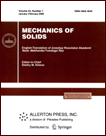 | | Mechanics of Solids
A Journal of Russian Academy of Sciences | | Founded
in January 1966
Issued 6 times a year
Print ISSN 0025-6544
Online ISSN 1934-7936 |
Archive of Issues
| Total articles in the database: | | 13427 |
| In Russian (Èçâ. ÐÀÍ. ÌÒÒ): | | 8178
|
| In English (Mech. Solids): | | 5249 |
|
| << Previous article | Volume 37, Issue 1 / 2002 | Next article >> |
| G. K. Wong, S. M. Kapustyanskii, V. N. Nikolaevskii, and Ya. V. Shlyapoberskii, "Elastic-plastic analysis of damage in the well bottom zone," Mech. Solids. 37 (1), 99-111 (2002) |
| Year |
2002 |
Volume |
37 |
Number |
1 |
Pages |
99-111 |
| Title |
Elastic-plastic analysis of damage in the well bottom zone |
| Author(s) |
G. K. Wong (Houston)
S. M. Kapustyanskii (Moscow)
V. N. Nikolaevskii (Moscow)
Ya. V. Shlyapoberskii (St. Petersburg) |
| Abstract |
Fracture of the well bottom zone is accounted for by the anisotropy of the
rock pressure and the pore pressure drop in the process of oil production.
In order to have a correct prediction of such events it is necessary to
subject the extracted soil samples to triaxial and uniaxial tests. The
data of destructive tests with low-cemented sandstone used in
this paper correspond to the non-associated flow law with
compaction and dilatancy.
We consider a horizontal well with a thin metal filter placed in its open
borehole and the annular space between the filter and the wall filled
either with gravel or fractured material of the bed (loose sand).
The two-dimensional problem corresponding to the cross-section of the well
is solved numerically. The solution demonstrates a qualitative change of
the stress and strain fields as the pore pressure drops.
The effect of localization of inclined strips determined
by the anisotropy of the rock pressure, as well as that of formation of
bearing arches which prevent the further motion of the sand toward
the well. Although the displacements of the walls of the well with an open
bottom were too small to cause the borehole fracture, the material of the
walls (subject to plastic fracture) was in the state of unstable
equilibrium. For this reason, we consider the prepacked gravel filter. We
calculate the transmission of pressure to the perforated metal column
(filter) placed in the center of the well. |
| References |
| 1. | V. N. Nikolaevskii, "Governing equations of plastic deformation
of loose media," PMM [Applied Mathematics and Mechanics], Vol. 35, No. 6,
pp. 1017-1029, 1971. |
| 2. | J. W. Rudnicki and J. R. Rice, "Condition of localization of
deformation in pressure sensitive dilatant materials," J. Mech. Phys.
Solids, Vol. 23, No. 6, pp. 371-394, 1975. |
| 3. | V. N. Nikolaevskii, Mechanics of Porous and Fractured Media,
World Scientific, Singapore, 1990. |
| 4. | V. N. Nikolaevskii, Geomechanics and Fluid Dynamics [in Russian],
Nedra, Moscow, 1996. |
| 5. | M. L. Wilkins, "Calculations of elasto-plastic flows," in
B. Alder, S. Fernbach, and M. Rotenberg (Editors), Methods in
Computational Physics. Fundamental Methods in Hydrodynamics. Volume 3,
Academic Press, New York, 1964. |
| 6. | S. M. Kapustyanskii and V. N. Nikolaevskii,
"A quantitative description of an elastic-plastic dilatancy model
(using the case of sandstone)," Izv. AN SSSR. MTT [Mechanics of Solids],
No. 4, pp. 113-123, 1984. |
| 7. | S. M. Kapustyanskii and V. N. Nikolaevskii,
"Parameters of elastic-plastic dilatancy model of geomaterials,"
PMTF [Applied Mechanics and Technical Physics], No. 6, pp. 145-150, 1985. |
| 8. | I. A. Garagash, N. N. Nikolaevskii, and J. W. Dudley,
"FLAC simulation of triaxial and compaction tests of an
unconsolidated reservoir sand," in FLAC and Numerical Modelling in
Geomechanics, pp. 505-510, Balkema, Rotterdam, 1999. |
| 9. | E. Detournay and C. M. St. John, "Design charts for a deep
circular tunnel under non-uniform loading," Rock Mech. Rock. Engng.,
Vol. 21, pp. 119-137, 1984. |
| 10. | M. B. Geilikman and M. B. Dusseault,
"Dynamics of wormholes and enhancement of fluid production,"
Paper 97-09.9p, The Petroleum Society, 1997. |
| 11. | S. B. Grafutko and V. N. Nikolaevskii, "The problem of sand
production in an operating well," MZhG [Fluid Dynamics], No. 5,
pp. 130-139, 1998. |
| 12. | S. M. Kapustyanskii and V. N. Nikolaevskii,
"A self-similar problem of sand production,"
PMM [Applied Mathematics and Mechanics], No. 5, pp. 875-884, 2001. |
|
| Received |
08 June 2000 |
| << Previous article | Volume 37, Issue 1 / 2002 | Next article >> |
|
 If you find a misprint on a webpage, please help us correct it promptly - just highlight and press Ctrl+Enter If you find a misprint on a webpage, please help us correct it promptly - just highlight and press Ctrl+Enter
|
|

 Russian
Russian  English
English